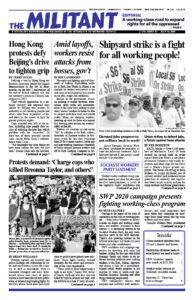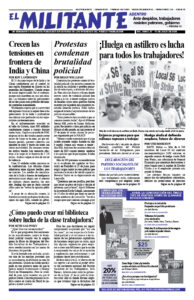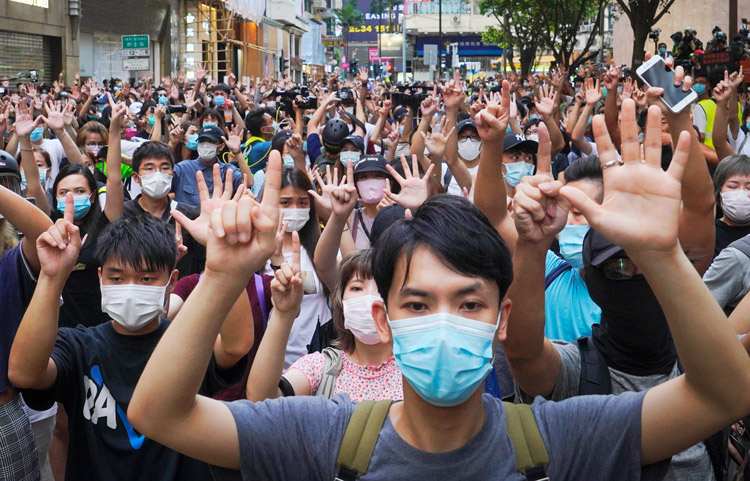Defying a ban by Hong Kong authorities thousands joined the biggest demonstration in the city in many months, on the July 1 anniversary of the end of British colonial rule and the territory’s return to Chinese sovereignty in 1997.
They voiced opposition to a national security law imposed days earlier by Beijing that widens its authority to jail working people and others who have organized strikes and taken to the streets to fight for greater political rights.
Cops arrested over 300 at the action, including nine people they accuse of violating the new law, which prohibits calls for “secession.” At least two of those arrested carried signs urging Hong Kong’s independence from China.
“We demanded the same things we have been calling for over the past year,” Daniel Chan told the Militant. He had joined a thousands-strong protest at Hong Kong’s Causeway Bay that day. They chanted, “Fight for freedom, stand with Hong Kong,” and “Five demands, not one less.”
Voiced by hundreds of thousands during the yearlong protests, those demands include calls for direct elections of the city’s chief executive officer and to its legislature and the release of all those arrested at demonstrations.
“The government wants to shut us up,” Roy Chan told Reuters at a protest of several hundred in the city days earlier on June 28, “We must stand up.”
That demonstration had also been banned by Hong Kong police.
On June 30 the top decision-making body of the Chinese parliament adopted the security law, which echoes restrictions imposed by Beijing to suppress political opposition elsewhere in the country. Beijing’s Hong Kong and Macau Affairs Office claimed the new law is a “guardian angel” to protect freedom and ensure peace. It went on to say that Beijing will now decide how to “generate the necessary deterrent force” to enforce the measure.
The Chinese government has already said it would establish a Hong Kong-based security bureau tasked with rooting out violations, including political “crimes” like “subversion” and “separatism.” Over the course of the last year, more protesters have raised demands for Hong Kong independence.
For more than 20 years, working people have turned out in large numbers for annual July 1 marches. Last year over half a million attended the event, many protesting the city government’s now withdrawn bill that would have authorized Beijing to extradite political activists for trial.
Cops claim the ban they imposed on this year’s march was necessary because of the coronavirus outbreak.
In fact, there has been no epidemic of COVID-19 in Hong Kong, largely due to measures carried out by the political opposition, writes Zeynep Tufekci in The Atlantic magazine. She says protest groups set up brigades to distribute masks, especially to those with little resources and to the elderly, and delivered free sanitizer in crowded working-class tenement buildings. The government had in fact banned wearing masks, a measure aimed at the demonstrators. Only seven people have died from COVID-19 in Hong Kong.
The government has rescinded many of the restrictions it imposed earlier. Museums, libraries and schools are opening up. But protests remain banned.
“Police are using the pandemic to suppress the public’s rights to march and rally,” July 1 march organizer Jimmy Sham Tsz-kit, of the Civil Human Rights Front, told the South China Morning Post. The Chinese rulers are determined to contain the protests in Hong Kong, as well as prevent resistance to their rule from spreading elsewhere in China.
Working people across the country face deepening hardship from rising joblessness, severe limits on unemployment relief and from bosses’ attacks on wages. The Chinese Labor Bulletin reported that in the last week of June workers staged protests demanding bosses pay wage arrears at a coal mine and a construction site in Beijing, and at an auto plant in Nanjing.


